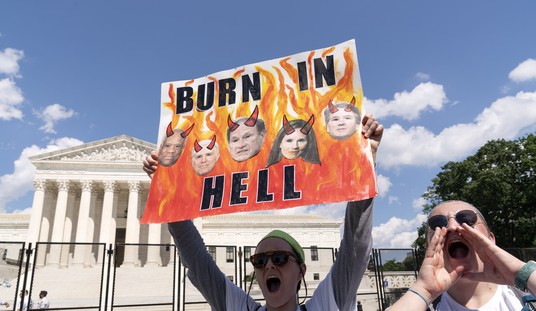According to a poll released on August 14 by Fox News, a solid majority of likely American voters — 58% — believe that Clinton “knowingly lied” about the presence of classified information on her server.
Only 33% of the overall electorate believes that there is some other explanation for what federal investigators have found. And 54% believe that she has damaged national security as a result.
If we break down the numbers by party affiliation, the result are more stark: 27% of Democrats think she lied, and 29% (!) think that she damaged national security. Some 87% of Republicans believe she lied and 81% that she damaged national security. Perhaps most crucially, 67% of independents say she lied and 54% say she damaged national security.
Assuming that Hillary Clinton will be the Democratic nominee (which is absolutely in doubt), how can she possibly win a general election? For that, let us take a thorough look at the Republican opposition.
There are a lot of ways to analyze the current 17-member Republican field. For instance, all three branches of the party (establishment, conservative, and libertarian) seem to be represented. Another way to break them down is by “outsiders” (people with no experience in elected office such as Donald Trump, Benjamin Carson, and Carly Fiorina) vs. “insiders” (all the rest). Yet another is in terms of connection to Washington (which would include at least the three current U.S. senators running) vs. the rest of the country.
All of the above have heir validity, but I prefer to break them down differently. (For what follows, I am relying on the RealClearPolitics polling average for the Republican field.)
First, let us agree that Trump is in a category all by himself; he certainly does not fit easily into any one of the three traditional “legs” on which the party has been oriented for the last 35 years or so. The Trump “category” has 22.3% of the Republican primary electorate behind him (the Fox poll gave him 25%).
We should be able to agree that Rand Paul is the closest thing to a libertarian running in this race. Paul’s support has been flagging seriously ever since he entered — the current average has him at 4% (Fox recorded 3%), basically negligible.
We enter more controversial waters with the “establishment” figures. A fairly strong case can be made for grouping Jeb Bush, John Kasich (who has hired many of the people who worked for the McCain and Huntsman campaigns), Chris Christie, and Lindsey Graham in this category. Bush is holding at 10.3% in the average, Kasich and Christie at 3.8% each, and Graham at 1.8%. This gives the establishmentarians 18.7% of the vote, grouped over four candidates.
All the rest are arguably conservatives, at least more conservative than anything else. We have Scott Walker with 8.5%, Ben Carson with 7.5%, Ted Cruz with 6.8%, Marco Rubio with 6.0%, Mike Huckabee with 5.5%, Carly Fiorina with 4.3%, Rick Perry with 1.5%, Rick Santorum with 1.3%, and Bobby Jindal with 1%. The summation is 42.4% of the Republican vote, making the conservative faction a solid plurality of the party; the problem is that it is grouped over nine candidates. Déjà vu 2012.
In 2012, Mitt Romney never got more than about 1/3 of the primary vote; 2/3 of the Republican electorate wanted someone else as the candidate, but the problem was that they never coalesced around one. We ended up with a candidate who, though the epitome of a decent human being, had far too many political liabilities, and the election was a fairly close one. As Hugh Hewitt put it a few years ago in the title of his book, If It’s Not Close, They Can’t Cheat. The corollary is that if it is close, they can. They did, in numerous crucial states (certainly in Ohio, Pennsylvania, and Florida, as well as my own Wisconsin). We got a second Obama term.
This alone will not help Clinton overcome 54% of the general electorate considering her a threat to American national security. But remember, she is being advised by one of the shrewdest, if corrupt, political minds, that of her husband.
Take a look at Bill Clinton’s two elections, and a clear pattern emerges. In 1992, he won by a plurality, made possible only because Ross Perot split the Republican vote with George H.W. Bush (37.5%) and Ross Perot (18.9%). Do the arithmetic: 56.9% of the vote went to “not Clinton.” Had Bush been able to win most of the Perot votes (he surely would have had Perot not run), he would probably have swung enough of the electoral votes his way to win a second term.
The 1996 election was much closer. Clinton still won only a plurality (49.2%) to Dole’s 40.7% and Perot’s 8.4%. As with the first election, Perot won no electoral votes but he was able to deny states to Dole, throwing the election to Clinton.
Donald became his own category in the first Republican debate, when he refused to pledge to support the Republican nominee if he is not it. Numerous writers have documented Trump’s record of supporting Democratic causes in general (Neil Stevens notes his recent paeans of praise for Bill de Blasio just before “suddenly” becoming a Republican). Perhaps the most significant revelation — reported in the Washington Post and the New York Times, neither a bastion of the “vast right-wing conspiracy” — in explanation of his sudden conversion is the revelation that Trump, who was always close to the Clintons, discussed politics with Bill shortly before his announcement.
The most charitable thing that can be said of Trump is that he is trying to emulate another of his previous favorite politicians, Michael Bloomberg, who ran for mayor of New York as a Republican to avoid the crowded Democratic primary. He did not hold any Republican convictions. A bit less charitable thing to say of Trump is that he is a willing dupe of the Clintons. If Trump goes through the motions, loses in the primaries, and declares a third-party candidacy, taking his 20% or so with him, there is likely to be another president Clinton in our future. That is, if Obama is somehow restrained from exercising his well-documented antipathy for the Clintons, and the boom is not lowered.
Who will be the likely Republican candidate? That will depend on the winnowing process of the primaries. As of right now, both in terms of votes and operating capital, the front-runners are still Bush, Walker, and Rubio, as Charles Krauthammer astutely observes. To these we can add at least Ted Cruz, who has been raising money very assiduously and spending it very carefully.
The big test will be March 1, when 11 largely southern states, including Republican powerhouses Georgia and Texas, will have their primaries. If there is a very clear winner by then, we’ll have our candidate, for better or for worse. If not, and the process drags as it did in 2012, the probable rapid collapse of Kasich, Christie, and Graham will cause the establishment types to coalesce around Bush. If a similar coalescence has not occurred around Walker, Rubio, or Cruz on the conservative side, then another Bush will likely be running, and the election will be close and equivocal at best. If Clinton is the Democratic candidate, she may well win. But if one of the above optimistic conservatives gets the nod, I expect a Reaganesque blowout no matter who the Democratic candidate is. One even large enough to trump Trump, should Clinton get through the coronation unindicted. In that case it won’t be close, so they won’t be able to cheat.









Join the conversation as a VIP Member